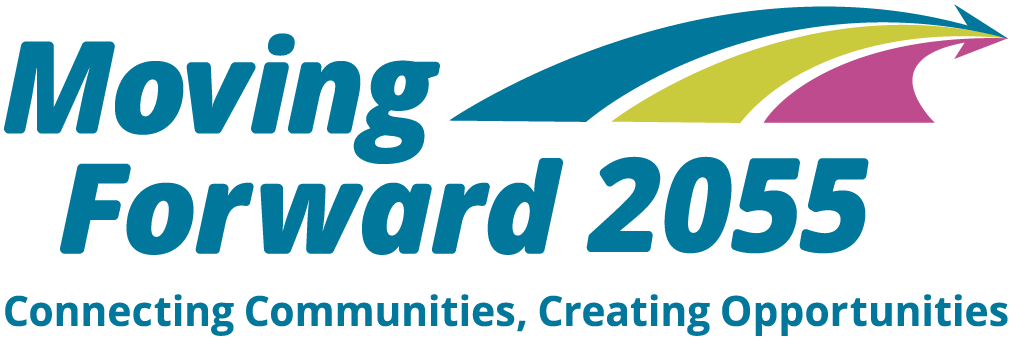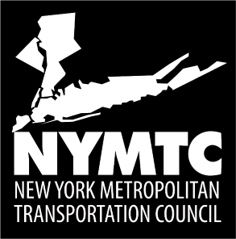Introduction
The New York Metropolitan Transportation Council (NYMTC) has developed its next Regional Transportation Plan (RTP or Plan), Moving Forward 2055: Connecting Communities, Creating Opportunities. The Plan covers all modes of surface transportation from a regional perspective including: highways, streets, public transportation, active transportation facilities, goods movement, and special needs transportation. In addition, it addresses key transportation system activities such as system operations and management, safety, and security, and it identifies funding sources to operate, maintain, and expand the system.
About the Plan
Moving Forward 2055 is a federally required planning product that presents the region’s long‐term transportation needs and desires over a minimum 20‐year time frame. The RTP is updated every four years. Moving Forward 2055 is a blueprint that helps support sustainable growth and guides federal funding for transportation investment in the region. Moving Forward 2055 covers the 2026‐2055 planning period and updates the previous regional transportation plan, Moving Forward.
NYMTC is the Metropolitan Planning Organization (MPO) for New York City, Long Island, and the Lower Hudson Valley. The boundaries of the MPO encompass the five counties of Suffolk, Nassau, Westchester, Putnam and Rockland, and the five boroughs of New York City. NYMTC coordinates the federally required transportation planning process and access to federal funding for this region’s transportation projects, including the State of New York’s Department of Transportation (NYSDOT), and the Metropolitan Transportation Authority (MTA).
Moving Forward 2055 was developed collaboratively with NYMTC member agencies, other regional stakeholders, and members of the public. Moving Forward 2055’s strategies, actions, and projects are organized by regional goals and objectives which define how the region intends to achieve NYMTC’s Shared Vision for Regional Mobility.
Public and Community Involvement in the Development of the Plan
NYMTC developed Moving Forward 2055 through a public involvement effort that engaged various constituencies and key audiences in its planning area. Input was gathered from the public, community‐ based advocacy groups, and other stakeholders, including a Regional Transportation Plan Subcommittee composed of NYMTC planning area agency members. Outreach for Moving Forward 2055 emphasized engaging with traditionally underserved communities and limited English proficiency populations.
Moving Forward 2055’s engagement program included a mix of in-person and virtual events spanning New York City, Long Island, and the Lower Hudson Valley. Outreach activities were undertaken with great care to ensure that diverse and representative input could be obtained.
- NYMTC initiated early outreach efforts by conducting several in-person pop-up events across its three sub-regions in October and November 2023. Input from these events was supplemented by an online regional survey that solicited over 2,800 individual responses, helping to identify critical needs and potential strategies across the region.
- In December 2023, virtual focus group meetings were conducted to better understand transportation issues and needs for stakeholders considered within the (1) Coordinated Human Services and (2) Community of Concern groups.
- During April, May, and June 2024, NYMTC held a series of Online Public Forums with regional experts. These forums enabled participants to share their insights on critical transportation issues, needs, and opportunities in the areas of freight, active transportation, human services, safety, micromobility, alternative energy sources, curb and parking management, and technology.
Moving Forward 2055 also leveraged on-demand videos introducing NYMTC’s role, the Shared Vision for Regional Mobility, transportation trends and needs, and Moving Forward 2055 strategies as part of its public comment period. The videos were shared online on Moving Forward 2055’s project website, to help engage a wider audience that otherwise may not have been able to engage during scheduled meetings.
Title VI Considerations
Recipients of federal aid, including MPOs, must comply with the
policies set forth in Title VI of the Civil Rights Act of 1964 and
other directives that address the disproportionately high and adverse
human health or environmental effects on minority and low‐income
populations. NYMTC’s current Title VI/Non-Discrimination Program
policy statement includes the following language*:
* Note, the current Title VI/Non-Discrimination Policy Statement was
adopted by NYMTC on November 17, 2022.
The New York Metropolitan Transportation Council (NYMTC) gives public notice of its nondiscrimination policy to ensure compliance with Title VI of the Civil Rights Act of 1964, the Civil Rights Restoration Act of 1987, Executive Order 12898 on Environmental Justice, Executive Order 13166 on Limited English Proficiency and all other related non-discrimination statutes, rules, regulations, and executive orders identified in the NYMTC Title VI/Nondiscrimination Program.
NYMTC assures that no person or group(s) of persons shall, on the grounds of race, creed, color, national origin, sex, marital status, disability, age, sexual orientation or income level, be excluded from participation in, be denied the benefits of, or be otherwise subjected to discrimination through the federally mandated metropolitan transportation planning process undertaken by NYMTC, whether the activities are federally funded or not.
It is also the policy of NYMTC to ensure that all its plans, programs, procedures, policies, and activities do not have disproportionate adverse effects on minority and low-income populations. Minority and low-income communities, as identified through the United States Census, will be engaged to facilitate their full and fair participation in the metropolitan transportation planning process. In addition, NYMTC will provide meaningful access to services for persons with limited English proficiency.
To assess the Plan in the context of this policy, U.S. Census data were used to create a Non-Discrimination Index that identifies areas with an above average percentage of populations cited in the policy statement, which are then mapped as NYMTC’s Communities of Concern (CoC). The CoC’s provide a framework to the Plan and its potential outcomes to ensure non-discrimination. Moving Forward 2055 includes a Title VI Assessment to ensure compliance with statutes regarding non‐discrimination.
Environmental Mitigation Considerations
Moving Forward 2055 includes an Environmental Mitigation and New Consultation report to ensure compliance with federal requirements and maintain NYMTC’s commitment to protect and enhance the region’s natural resources, promote energy conservation, improve the quality of life, and encourage consistency between transportation improvements and state and local planned growth. NYMTC’s consultation process for Moving Forward 2055 included outreach to partner agencies for input on environmental initiatives in the NYMTC region and alternatives for participating in outreach activities that informed the development of the Plan.


